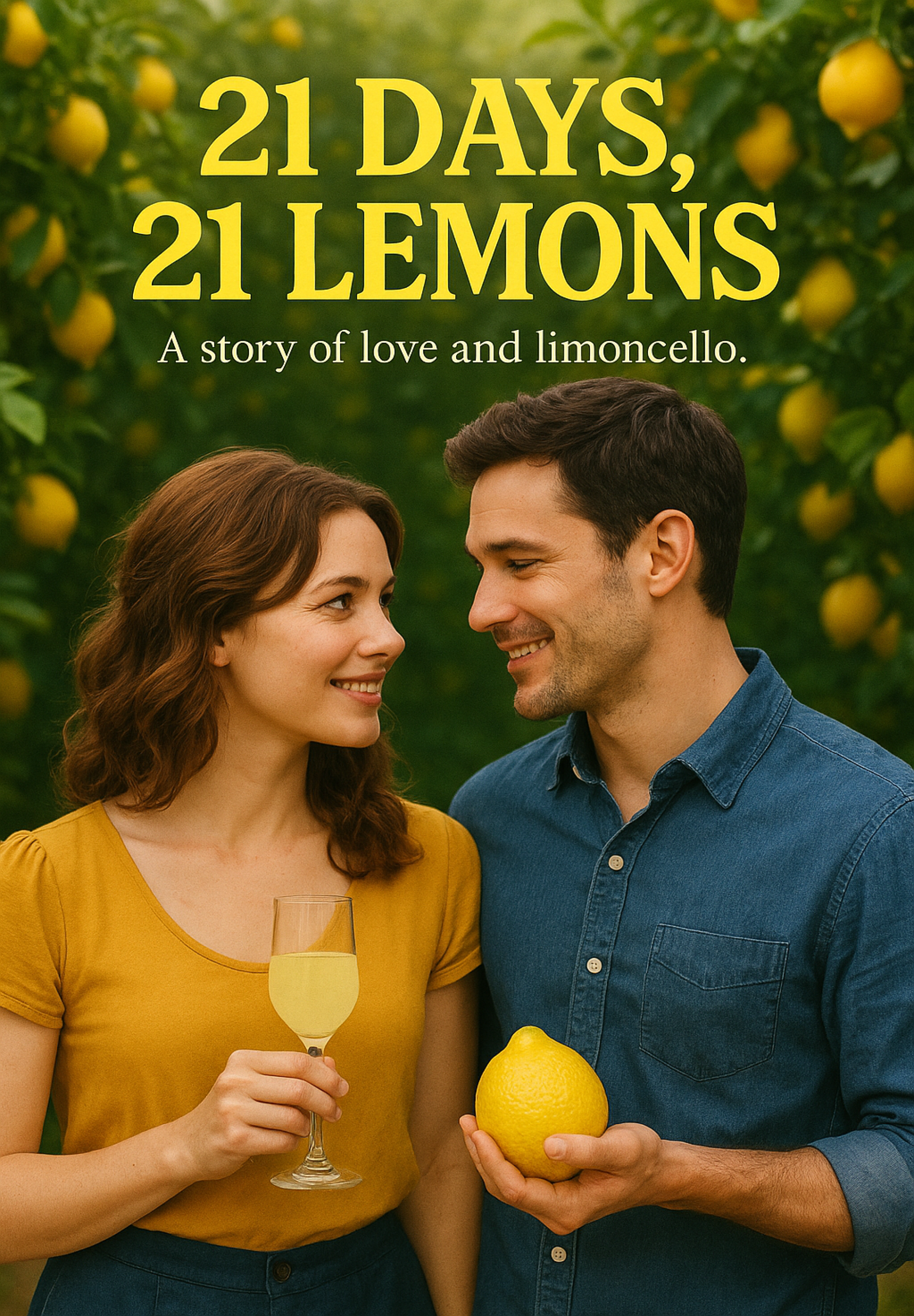
Synopsis/Details
Act I – Sour Beginnings
Olivia Bennet, a sharp, ambitious journalist in New York, is in professional exile. After her hard-hitting exposé on a gangster rapper sparks a lawsuit, her magazine Civic & Style demotes her to a “fluff” assignment: twenty-one lemon groves in twenty-one days on Italy’s Amalfi Coast. Her managing editor, Evelyn Sharpe, warns her: deliver something light and charming, or don’t come back. Furious and humiliated, Olivia confides in her cousin Giulia, who teases that maybe Italy — and lemons — will prove more than she expects.
Arriving in Naples, Olivia meets Luca Romano, her assigned driver. Rugged, rooted, and sardonic, Luca embodies everything she disdains: tradition, patience, a lack of urgency. Sparks fly immediately — not romantic ones, but clashes. Olivia insists on city pace; Luca insists on Amalfi’s rhythm. Even their language skews: to him, she is “Oliva,” not Olivia.
Their first grove visit introduces Giovanni Rinaldi, who speaks of lemons as heritage, not commerce. Olivia, trying to impress, asks about sugar-free limoncello — earning Giovanni’s laughter and Luca’s scorn. Tripping in the orchard, Olivia feels humiliated, but Giovanni blesses her warmly as she leaves: a hint that these groves are more than background for a puff piece.
Meanwhile, Luca confides in his grandmother, Nonna Rosa, who raised him. She offers parables: a swallow who stops flying only when it finds its true home, a lemon tree that blossoms with care. These stories, aimed at Luca, also reflect Olivia’s arc — she has not come for lemons, but for healing.
________________________________________
Act II – Bitter and Sweet
The journey unfolds grove by grove, a patchwork of traditions and characters. In Enzo Vitali’s Limoneto delle Stelle, Olivia marvels at his poetic belief that lemons listen to the stars. In another grove, carved lemons glow like lanterns for festivals. At a wedding orchard, Olivia and Luca are mistaken for relatives, plied with food and limoncello, and end up barefoot dancing under string lights until the crowd chants “bacio!” (kiss). They pull back, laughing nervously, but something new lingers.
Comedy lightens their clashes: Olivia, in city sneakers, climbs a rickety ladder to “prove” herself and tumbles into Luca’s arms. Nonna Rosa teaches Olivia to roll pasta dough; flour fights erupt. A storm forces Olivia and Luca into a farmhouse, where she panics as her laptop dies — her notes lost. Luca soothes her: “You’ve already written this story — in your eyes, every time you taste.” Their first real kiss comes here, slow and tender against the sound of rain and candlelight.
But the sweetness is undercut. At Costa degli Agrumi, a cooperative grove exporting limoncello worldwide, Olivia admires the business model while Luca calls it soulless. Manager Dario openly flirts with her during the interview; Olivia plays along, half to get quotes, half to needle Luca. His jealousy boils, and on the night drive back, he blurts: “Because you don’t see when people aren’t serious.” It’s their first raw crack — protectiveness betraying deeper feelings.
Later, at a limoncello contest, Olivia shocks everyone by mixing basil and sparkling water with limoncello. Luca calls it sacrilege, but when he tastes, he’s surprised: it’s delicious. The farmer declares it “love in a glass,” and the crowd chants “bacio!” again. They almost kiss but pull away, flustered. For the first time, they are collaborators, not adversaries.
Their false high comes at I Frutti di Marevista. Here, villagers carve lemons into shapes for the festival. Luca shyly carves a lemon into a heart and hands it to Olivia. She laughs, but treasures it. For the first time, she admits: “I could see myself staying here longer.” Luca softens, vulnerable — they are finally aligned. Which only means the fall must come.
________________________________________
Act III – From Sour to Sweet
The fracture arrives when Civic & Style publishes Olivia’s article online under a sensationalized headline: “Romance on the Road: 21 Days, 21 Lemons.” The story reduces Luca, his family, and the groves to a glossy travel-romance. Luca feels betrayed. “So I am just a headline? Not a man, not a family, not our land — a story?” Olivia pleads it wasn’t her headline, but admits she’s torn between her duty and her heart. Hurt, Luca tells her maybe she should go home.
Alone in a grove, Olivia feels the emptiness of his absence. She scrolls through photos: Luca laughing in flour fights, driving the Fiat, pointing at stars on the beach. Every lemon was their story. Sipping limoncello, she finally sees it. Nonna Rosa finds her, gently saying: “The sweetest limoncello takes time. So does love. Do not leave before it’s ready.” Olivia realizes she must fight for him.
The climax arrives at the Festival of Limoncello, where all twenty-one groves gather to present their batches. Luca, distant, cold, pours his family’s limoncello without joy. Olivia arrives late, clutching her notebook, and stands before the crowd. Nervous, she reads aloud: “I came for twenty-one lemons in twenty-one days. But what I found was patience, tradition, and love — love that, like limoncello, begins sour but becomes sweet if you give it time.”
The piazza falls silent. Then applause erupts, the crowd chanting “bacio! bacio!” Luca steps forward, voice raw: “Do you mean it?” She whispers back, “Every word.” They kiss — no hesitation this time — as lantern-lit lemons glow and the crowd roars.
In the epilogue, Olivia remains in Positano. She writes not a headline but her truth, finishing her article at Nonna’s kitchen table. Luca brings her coffee, teasing gently. Their story, like limoncello, has ripened — proof that sweetness comes with time.
Story & Logistics
Story Conclusion:
Happy
Linear Structure:
Linear
Cast Size:
Few
Locations:
Few




